RESTORATIVE COMMUNITIES NETWORK MEETING
Canberra as a Restorative City
November 18, 2015
What a wonderful opportunity -- joining Restorative Justice practitioners and champions from the ACT Restorative Communities Network to hear Senator Vern White speak about his experience applying restorative justice practices to his work in Canada. The Q & A that followed and ‘buzz groups’ helped build understanding and a feeling that Canberra can lead the way -- by working towards being an RJ community.
I’d like to contribute my ‘executive summary’ from the session on November 18 as a resource for the ‘learning community’ of RJ practitioners, researchers, theorists, and other ‘RJ fringe dwellers’ such as myself. Briefly, I am a Social Worker trained in conflict resolution and was introduced to RJ practice through colleagues in the ‘RJ learning community’ associated with the RegNet Unit at the Australian National University.
The following dot points are what I ‘learned’ on November 18. The points may not be whatother’s heard so…in the RJ tradition, create respectful space:
• The ACT Restorative Communities Network is coming together with the vision of connecting leaders to expand restorative justice principles and practice across the Canberra community.
• The vision includes – finding practical ways to build resilient and harmonious communities – fostering connection to others to feel safe, thrive, and resolve problems – healing harm and building connection.
• Senator Vern White spoke about the role police play in this vision and their positive impact on families based on 25 years with the police in Canada. He wryly described how a cop saw potential in him as a young man - he learned that people treated with humanity can ‘get’ the impact of their behavior on others. And change…
• When RJ was introduced to Newfoundland in 1985, Vern said 72% of offenders were reoffending – a high % were young people who did not have a safe place to go at night due to violence at home. RJ introduced family conferencing, breakfast clubs, homework clubs, and a safe place for young people to sleep at night -- reoffending rates changed.
• Vern also introduced victim satisfaction feedback with the RJ process -- victim’s voices were heard and community was part of the practice. RJ for victims helped restore faith, forgiveness and accountability.
• In Canada, the police facilitate RJ conferencing but not in Australia. Canberra was offered encouragement to – be like a snake, where the head goes the body follows. RJ requires police participation to succeed. Heads need to become active champions for RJ. Through RJ, create space where all voices are heard.
• During the Q & A, Australia’s high offender rate was described and the relationship to drug and alcohol use – an addict commits 4-6 crimes per day to fund an addiction. Australia has the highest use of ‘ice’ internationally. To change this statistic, Australia needs to target trafficking and deal with addiction with more treatment centers. RJ is cheaper than jail – Every $1.00 spent on RJ = $8.00 in reduced drug crime.
• Communities can use RJ for peace building and to strengthen relationships through restorative practice. Tribunals report the worst level of victim satisfaction is with neighborhood disputes – although participants may not like each other they can learn how to talk through RJ conferencing. Some lawyers are starting to use RJ!
• Website: canberrarestorativecommunity.space
Dr. Sherene Suchy (AASW),
DUO PLUS - PO Box 926 Jamison Centre, ACT 2614 Australia
P: 02 6251 9939 W: duopluseq.com E: s_suchy@iprimus.com.au



